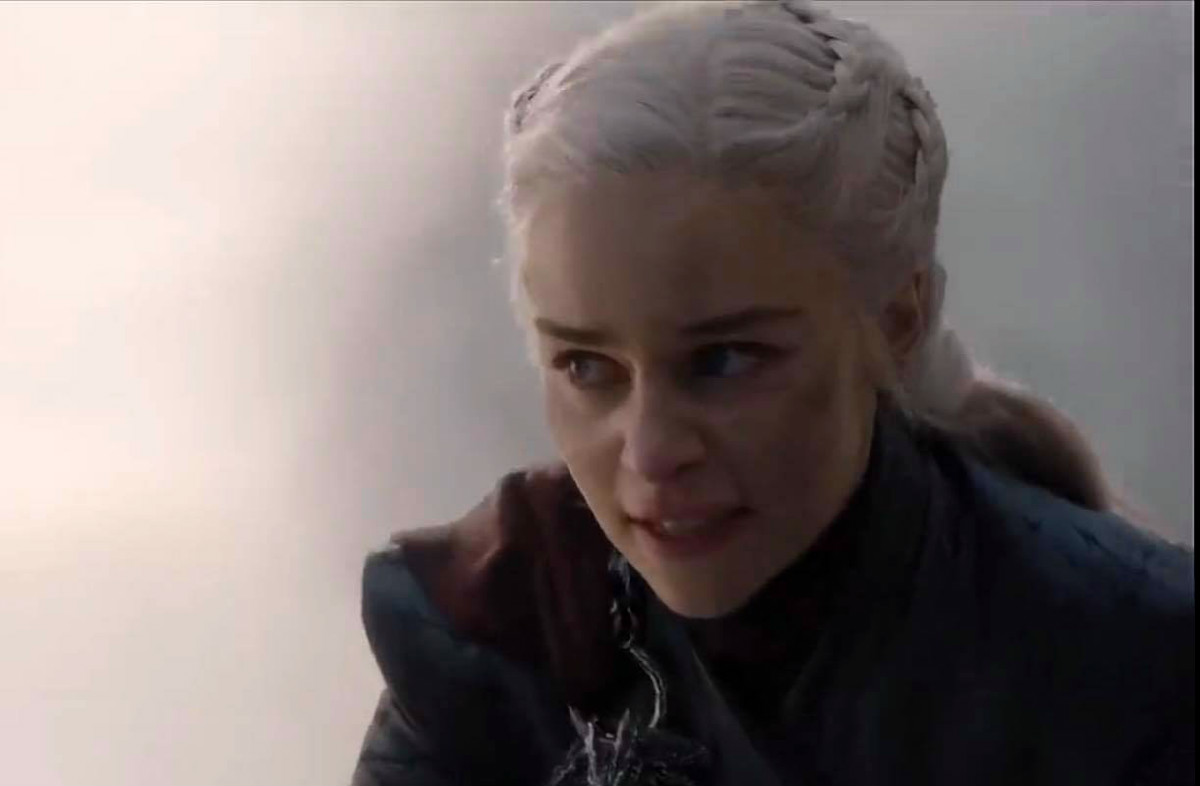Game of Thrones’ ‘The Bells’ Was a Slap in the Face to Mothers Everywhere

This week’s episode of Game of Thrones was the worst of the series — and there have been some doozies, last week included — and it aired on Mother’s Day. So let’s pour one out for all the moms celebrating in their “Mother of Dragons” t-shirts, and talk about Weiss and Benioff’s insulting use of the theme of motherhood in the episode.
I probably don’t need to remind you, but the plot of the episode — titled “The Bells” — revolved around a hairpin turn in Daenerys’ character. After hearing bells rung in surrender throughout King’s Landing, Dany visibly made a choice to systematically destroy the city and burn thousands of its citizens alive. She was even shown flying toward the Red Keep with the apparent plan to destroy Cersei alone, only to veer off, changing her mind and deciding to barbecue some peasants along the way. This is what baffled and enraged fans: not the twist itself, which many have predicted since day one, but its suddenness and illogic. The last few seasons of the show, rather than investing in a character arc that might have shown Daenerys’ oncoming downturn, doubled down on our image of her as a heroic and altruistic, if somewhat grandiose, leader. Considering Daenerys had a mere supporting role in the three episodes leading up to and including the Battle of Winterfell, there’s really only one episode’s buildup to her hairpin turn, and it’s not very convincing. Artful narrative misdirection hints simultaneously at several possible directions for the plot; bad narrative misdirection purposefully deceives the audience in order to maximize shock value, and that’s what we have here. It’s disrespectful to the enthusiastic and intelligent fanbase of the show.
We are given a handful of nominal reasons for Dany’s breakdown. This season isolates her: she loses her closest friends Jorah and Missandei to the Night King and Cersei, respectively; she is “forced” to execute Varys, a close advisor, for treason; she loses her faith in Tyrion’s strategic abilities and is romantically rejected by Jon, though he remains her staunch political ally. But, to many fans, the crux of the issue is Dany’s dragons.
In season one, Dany is pregnant when an enslaved woman, Mirri Maz Duhr, tells her that she can magically heal Khal Drogo’s fatal wounds in exchange for the life of the fetus. Understandably, Dany agrees; Mirri heals Drogo’s body but leaves him a vegetable, and explains to Dany that she has given up not only her current unborn child, but also any ability to bear a human child in the future. It is from Khal Drogo’s funeral pyre — also the stake at which she burns Mirri alive — that the dragons are born. Thus, “Mother of Dragons.” She has told several of those close to her, most recently Jon, that she cannot have any more children, and this is probably the reason few characters take the idea of a marriage between Dany and Jon seriously. It is closely guarded information, however, because confirmed infertility pretty much disqualifies a woman from a medieval throne.
The dragons are, we are repeatedly reminded, her children, and that makes Dany a grieving mother. Last season, she lost Viserion to the Night King; this season, Rhaegal and Drogon had to fight their brother’s reanimated corpse at the Battle of Winterfell. Then, last episode, in one of the worst-planned attacks in the history of Westeros, (seriously, I write the recaps and I’m still not sure what Dany was aiming for there), Rhaegal was felled by a series of bolts from Euron’s scorpions. Having lost two children and now isolated from all her human companions, Dany only has Drogon to cling to.
This situation is certainly the makings of a tragic character arc; however, that is not what happens to Dany. What happens is that she snaps. The messages are mixed, but all of them are misogynist: that mothers are dangerous, that infertile women are so addled by grief that they become dangerous, that it’s dangerous to reject a woman sexually (a laughable inversion of the reality of the situation), and, most importantly, that women are unstable and emotional. One of the theses of Game of Thrones as Weiss and Benioff have written it is, “mothers will do anything for their children–be afraid.”
How many innocents will a Game of Thrones woman slaughter in order to protect or avenge her children?
Historically, the number is limitless. While this is the first time Dany has done so, we’ve seen a shining example of this trope of predatory, self-absorbed motherhood in Cersei from the very first episode. The most obvious manifestation of this was her relationship with her son Joffrey: Cersei was aware that he was a monster, and that it was probably his incestuous parentage that made him so, but she defended his every action nonetheless, and we were supposed to see this as motherly love. When Dany was shouting, “Where are my dragons?,” when Catelyn continued to resent Jon Snow simply because he wasn’t her biological child, when Lysa Arryn screeched orders of execution while breastfeeding her seven-year-old child, when Robb’s pregnant wife was stabbed in the stomach on Cersei’s orders, we had Cersei’s treatment of her children to rub salt in the wound. Mothers, per Weiss and Benioff, are irrational, emotional creatures, and this makes them monsters.
There are a few foils to this theme: the victimized mothers. These characters are loving but ineffectual, like Sam’s mother, who is under the thumb of her abusive husband, or Gilly, who is raped by her father and names the resulting child after the man who rescues her. Or like the woman who helps Arya up when she falls in the crowd in “The Bells,” and whom Arya tries to save. It is the sight of the woman and her child dead in the wake of Drogon’s fire that spurs Arya to action, presumably an action she plans to take against Daenerys. Arya, who just last episode refused an opportunity to become a wife-and-mother, is the one with the agency to end Dany’s reign of terror.
Which brings me to the end of Cersei’s. Trapped with Jaime in a castle that is about to crumble on their heads, Cersei breaks down crying, saying, “I don’t want our baby to die.” Oh boy. Now, regular readers will know that I have argued since Cersei announced her pregnancy that it was a fake. Last season, when she announced the pregnancy at the King’s Landing summit, she as good as told both Qyburn and Jaime that it was a ploy to make herself look weak and sympathetic so that Dany, Jon, and Tyrion would trust her. She stopped drinking as part of the ruse. In the first episode of this season, she started drinking again, and she shared a knowing look with Qyburn every time the pregnancy was brought up. When she told Euron, who was at the summit last season where she announced a pregnancy, that she was pregnant with his child, he reacted as if he not only believed it, but as if it was new information. Then she shared another knowing look with Qyburn. Plus, you know, there was that whole prophecy that Cersei would only ever have three children.
But this is more than just another case of bad-faith narrative misdirection. More than anything, the reasons why Cersei’s pregnancy being genuine makes no sense are thematic. First of all, the whole reason for this plotline seems to have been to reveal that Tyrion’s one blind spot is his belief that Cersei’s motherhood is her redeemable quality. If we are to accept that Cersei’s pregnancy was real, that means Tyrion is right about that. This not only flattens Tyrion’s character, but is also obviously counterfactual. In the early seasons, all of Cersei’s most monstrous deeds are framed as attempts to support her children, most notably her campaign of psychological and sometimes physical abuse against Sansa. Which one would think, given that he was there the whole time and even married to Sansa for part of it, Tyrion might have noticed.
That’s what’s baffling about the manner of Cersei’s death. More realistically, she never would have gotten to that point — I remain firm in my belief that she would have killed herself while seated on the throne, unborn child or no, just as she almost did to herself and Tommen in season two — but even if she had, and even if the pregnancy were real, a realistic Cersei would have looked Jaime in the eye and said, “At least we can die as a family. At least our enemies won’t have the satisfaction of killing us or our child.” That’s the Cersei we know. A monster, yes, but a very specific kind of monster.
From the first, the tropes of motherhood have plagued both Dany and Cersei and muddled their characters. This season has proven that, rather than seeing the two — or any of their female characters, really–as individuals with agency, Weiss and Benioff have depended on lazy stereotypes of “how women are” and, more specifically, “how mothers are.” These troubling themes have always been present in the story, but in earlier seasons, thanks to the strong scaffolding of George R.R. Martin’s (still problematic, but complex and deft) writing, they were at least anchored by realistic behavior and character development. Now we see the personhood of the show’s mothers, both heroic and villainous, stripped down to a series of poisonous archetypes.
If Weiss and Benioff were going to write this, if HBO was going to air it, they should have had the sense not to air it on Mother’s Day. What a slap in the face to the diverse women who have raised children or lost them, who turn to Game of Thrones for both escape and empowerment. Shame. Shame. Shame.






